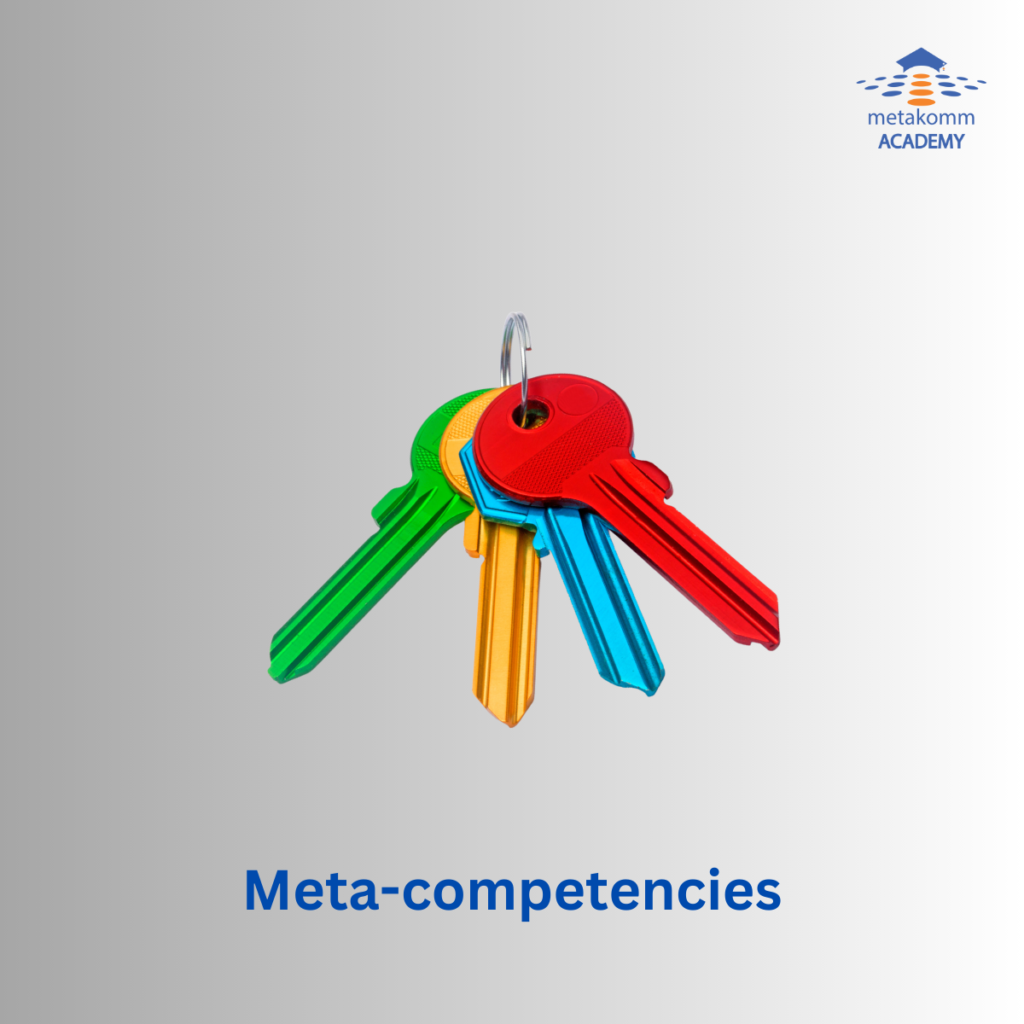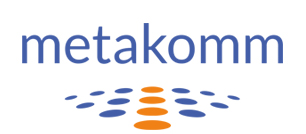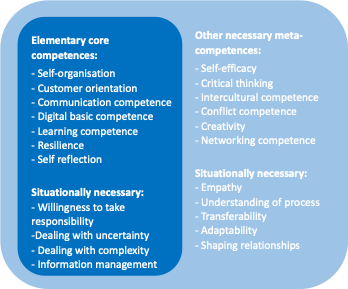The importance of meta-competences for a sustainable working world

In this article we describe which meta-competences are necessary to lead oneself and others in the current world of work.
Further education in times of the VUCA world
CET in employee and leadership development is currently undergoing a fundamental change. One of the main causes of this change is the so-called VUCA world – a world characterized by volatility, uncertainty, complexity and ambiguity. In such a dynamic environment, there are few reliable and static bodies of knowledge left. Old knowledge is quickly outdated, new technologies and ways of working are constantly emerging, and the demands on employees and managers are constantly changing.
Meta-competences enable future-proof work
In view of these facts, the trend in continuing education are “meta-competences”. Meta-competences can be seen as coping strategies for the demands of the modern world of work. Instead of learning a comprehensive compendium of “ready-made competences”, the focus is now on developing flexibility, openness andwillingness to learn among employees and managers.
The meta-competences enable people to adapt quickly to change, to take on new challenges and to learn continuously. It is not about acquiring specific skills that may be outdated in a few years, but about developing mental and emotional agility to meet the demands of the ever-changing world of work.
The influence of New Work and Digitalization on modern learning development
Our working world is changing due to trends such as new work and digitalization. The possibilities regarding working time and place are increasing more and more. Virtual and hierarchy-free teamwork is gaining in importance, while the role of managers is being completely redefined. This clearly shows that digitalization is advancing in leaps and bounds and increasingly intervening in work structures and processes, resulting in visible changes. According to a study, the importance of self-direction will increase strongly.
Evidence-based research findings: The underpinning of scientific studies
Prof. Dr. Nele Graf, has studied these changes: “In the past, teamwork and flexibility were required regardless of the professional job, but in the future, new so-called meta- or key competences will come to the fore. Our study shows which meta-competences really make employees fit for the future.” (Graf, N., Gramß, D., & Edelkraut, F. (2017). Agiles Lernen: Neue Rollen, Kompetenzen und Methoden im Unternehmenskontext. Haufe-Lexware)
The study identified 22 competencies that employees need in order to be able to work healthily and productively in the future. The five competencies “basic digital competencies, self-reflection, resilience, self-organisation and communication skills” are particularly important. Individual creative freedom and the associated responsibility are increasing, while control mechanisms and leadership support are decreasing. In the open, individualized and rapidly changing environments of the future, self-direction is of great importance. Employees must learn to deal with this new-found freedom and, at the same time, increasing uncertainty.
Graphical summary of the 22 core competencies:
Definition of the 22 core competences:
Self-organization: The ability to effectively plan, structure and manage one’s own tasks and resources in order to achieve goals and work productively.
Customer orientation: The ability to identify, understand and respond to customers’ needs, expectations and concerns in order to provide them with added value and a positive experience.
Communication competence: The ability to convey information clearly, concisely and understandably, as well as to listen actively and interact appropriately with others in order to communicate effectively and build relationships.
Basic digital literacy: The understanding and skills in using digital technologies and tools to use them effectively, whether for information gathering, communication, collaboration or problem solving.
Learning competence: The ability to continuously acquire, adapt and develop new knowledge and skills to keep pace with the changing demands and challenges of the world of work.
Resilience: The ability to cope with stresses, challenges and setbacks, to adapt, recover and move on in order to maintain psychological resilience and personal stability.
Self reflection: The ability to look at oneself critically, to recognize and learn from one’s own behavior, strengths and weaknesses in order to promote personal growth and development.
Willingness to take responsibility: The willingness to take responsibility for one’s own actions, decisions and results, to observe ethical principles and to proactively contribute to the achievement of goals.
Dealing with uncertainty: The ability to adapt in uncertain and volatile situations, to remain flexible, to weigh risks and to make decisions even if not all information or outcomes are predictable.
Dealing with complexity: The ability to understand, analyze and simplify complex interrelationships in order to derive appropriate action strategies and solve complex problems effectively.
Information management: The ability to collect, organize, evaluate and use information effectively to gain relevant insights, make informed decisions and work efficiently.
Self-efficacy: The belief in one’s own ability to successfully complete tasks and achieve goals, as well as the motivation and determination to tackle these challenges while making a positive impact on one’s life.
Critical thinking: The ability to analyze information and arguments carefully, to take different perspectives, to think logically and to draw sound conclusions. It includes the ability to question assumptions, examine evidence and make factual decisions.
Intercultural competence: The ability to recognize and respect cultural diversity and to work successfully with people from different cultural backgrounds. This includes understanding cultural differences, the ability to communicate interculturally and the willingness to adapt to different cultural contexts.
Conflict competence: The ability to recognize, analyze and constructively resolve conflicts. It includes the ability to communicate effectively, consider different points of view, find compromises and strive for win-win solutions.
Creativity: The ability to generate new ideas, concepts and solutions. Creativity involves thinking outside conventional boundaries, linking different ideas and finding innovative approaches to problem solving.
Networking skills: The ability to establish, build and use relationships effectively to obtain information, resources and support. It includes active networking, maintaining contacts and the ability to interact in different social and professional environments.
Empathy: The ability to empathize with and understand the feelings, perspectives and needs of others. Empathy includes sensitivity, compassion and the ability to build and maintain interpersonal relationships.
Process understanding: The understanding of workflows, processes and interrelationships within an organization or project. It includes the ability to grasp the overall context, identify weaknesses and optimize processes.
Transferability: The ability to transfer knowledge and skills from one situation to another and apply them in new contexts. Transferability involves adapting and applying learned concepts, methods and experiences in different situations.
Adaptability: The ability to adapt flexibly to new situations, demands and changes. It includes the willingness to change, openness to new things and the ability to adapt quickly to new circumstances.
The new direction of the modern world of work:
rethinking knowledge and skills without neglecting the importance of “ready-made knowledge”.
Of course, there is still “ready-made knowledge”. This knowledge is like a kind of specific recipe that can be learned. Basic knowledge and skills in certain areas are therefore still important. However, it is increasingly recognized that a new orientation is necessary to meet the challenges of the modern working world. The further training of our Metakomm Academy therefore aims to enable employees and managers to react flexibly to changes, to acquire new knowledge and to continuously expand their skills.
Overall, it can be said that further training in employee and management development is undergoing a paradigm shift. Instead of focusing on static knowledge, the focus is now on developing meta-competences to meet the demands of the VUCA world. Flexibility, openness and willingness to learn are the key competences that are increasingly in demand in the modern working world.
The flexible learning journey models of our new Metakomm Academy project aim to equip employees, managers, teams and individuals with the necessary meta-competences to succeed in an ever-changing world of work. We look forward to presenting these soon and to shaping the future of work together with our clients.
Ines Schmitz for Team Metakomm
Would you like to learn more about the meta-competencies and the Metakomm Academy? We would be happy to support you.
Feel free to contact us here.




